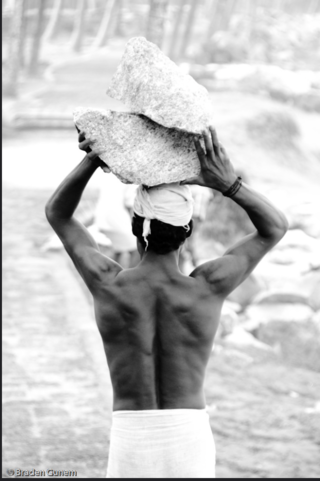Caregiving
Are You Carrying Baggage That Doesn't Belong to You?
The difference between caring and caretaking.
Posted January 28, 2022 Reviewed by Ekua Hagan
Key points
- Many people confuse caring with caretaking: A person who is caretaking will over-empathize with others at the expense of their own wellbeing.
- Caretaking behaviors are usually the result of misguided beliefs that were picked up in childhood.
- Caretaking burdens may be passed from generation to generation.

Imagine you’re walking down a path when you encounter a stranger carrying a boulder. Suppose the person bemoans their aching back and offers a litany of reasons why they can’t put the rock down.
Feeling your heart tug, you might point to the slab of granite in your own arms and say, “So sorry. I get it. Being human can be tough.” You might even briefly set yours on the ground and offer to hold their boulder with them to relieve some of the pressure.
But suppose you carry it for them, either because you can't bear their pain, or you feel responsible. As you continue your journey, the extra weight will probably slow you down and strain your back. Now, you not only have a herniated disk, but you're also resentful.
And here’s the thing… chances are, no matter how relieved your new friend initially felt, they would probably find a replacement boulder because, for reasons they haven’t taken time to understand, their arms feel empty without one.
Some people confuse caring with carrying. And while these words may look and sound alike (though not etymologically related) those two extra letters can make a weighted difference in how we respond to other people’s emotional baggage, particularly in relationships.
Caring is an open-hearted feeling, synonymous with compassion. When you care about someone, you empathize with their pain, tapping into a felt sense of common suffering. You can also act in a caring way, offering to help or witness, while paying attention to and respecting your own limits.
Carrying is when you take on others’ suffering for them, at the expense of your own wellbeing. Often this manifests in caretaking behaviors like trying to fix someone when they aren’t trying to help themselves, or rushing to placate and forgive someone’s bad behavior because you feel unnecessarily guilty. In short, it’s a refusal to set healthy boundaries.
While carrying may be rooted in caring, when you over-empathize with other people’s pain without empathy for your own, you are essentially abandoning yourself.
How we pick up boulders
Some may describe this carrying tendency as “codependent.” But as an Internal Family Systems (IFS) therapist, I prefer to see these behaviors in terms of protective parts and burdens.
IFS, also known as “parts work,” is a holistic, evidence-based approach to psychotherapy that identifies and addresses multiple sub-personalities or families within each person’s mental system, each with its own viewpoint and qualities. IFS sees consciousness as composed of an inherent Buddha-like core self with protective parts that, when balanced, help us survive and thrive, but when threatened, can go into overdrive to protect us from being overwhelmed by emotional burdens we pick up in childhood.
It assumes that everyone is born with a core Self that is inherently calm, compassionate, confident, curious, creative, courageous, clear, and connected. However, we lose access to that Self-energy in childhood when our basic needs for love, attention, and safety are met with neglect, rejection, anger, and/or an absence of safety or wellbeing.
Children naturally put all their trust in their caregivers to take care of them and offer feedback about who they are (“you’re lovable and you matter”) and the world (“it’s safe"). When children experience breaches of this trust, their spongy, self-centered brains blame themselves—for example, "I’m unlovable, invisible, inferior, bad, alone"—as it’s much too scary to think that the all-powerful grown-ups can’t be trusted to protect and nurture them.
IFS calls these internalized beliefs, thoughts, and feelings that children pick up from such experiences as “burdens.” Left unchallenged, children continue to carry these burdens inside their bodies into adulthood by exiling them from their awareness and enlisting protective parts to control or distract them from the emotional overwhelm. This unconscious process helps the child survive in less-than-ideal conditions.
Compassion vs. protection
Understood through the lens of IFS, caring is a natural expression of the Self-energy quality of compassion, while carrying is a type of protection against deeper pain that originates in childhood.
For example, Alan, 34, has a carrying part that is quick to appease family, friends, and colleagues when they are upset, even when he feels mistreated, bogged down, or angry himself. While he initially experiences relief, parts of him remain hurt and resentful. In our sessions, he shared that he would rather alleviate their pain than contribute to it by expressing his feelings or setting boundaries.
As a sensitive and empathetic child, Alan was very attuned to his father’s dark moods and disappointed dreams. Because children often feel responsible for their parents’ emotions, Alan developed parts that would go out of their way to make sure his dad wasn’t upset, as other parts hid his own feelings not only from his father but from himself. This pattern was further compounded by the way he interpreted Christianity as a child. Though he no longer identified as religious, some young part of him still believed that being a good person meant carrying other people’s burdens the way Christ bore the sins of mankind.
Consequently, Alan carried these three burdens—his father's, the religion of his childhood, and his own unprocessed pain—into adulthood, where it was weighing him down.
Sometimes these caretaking tendencies are passed like boulders from one generation to the next until someone gets tired of carrying them. In IFS, we call these boulders legacy burdens, and witnessing the situations in which one's parents and ancestors picked them up, and passing them back to the historical source of pain (for example, slavery, persecution, or poverty), can be a huge release.
How to determine if you have an overactive carrying/caretaking part
The following questions can help you determine whether your care is really a carry:
- When someone has hurt your feelings, do you withhold sharing your feelings in a respectful way to avoid hurting them?
- If so, would you feel guilty if you had the courage to share in a respectful way, but the other person had a negative reaction?
- Do you take on responsibilities for loved ones that they could easily do themselves, but refuse to do so?
- Do you withhold asserting your needs because you fear it would make others uncomfortable?
- Do you tend to overestimate your own ability to take on other people’s problems?
- When someone shares their pain, do you feel responsible for fixing it?
If you answered "yes," to one or more, it's important to remember that most of us carry emotional boulders of some sort. And while we can empathize and support one another along the road, each of us is ultimately responsible for lightening our own load. The first step is simply recognizing what does and does not belong to you, and understanding that the full expression of empathy includes self-compassion.




